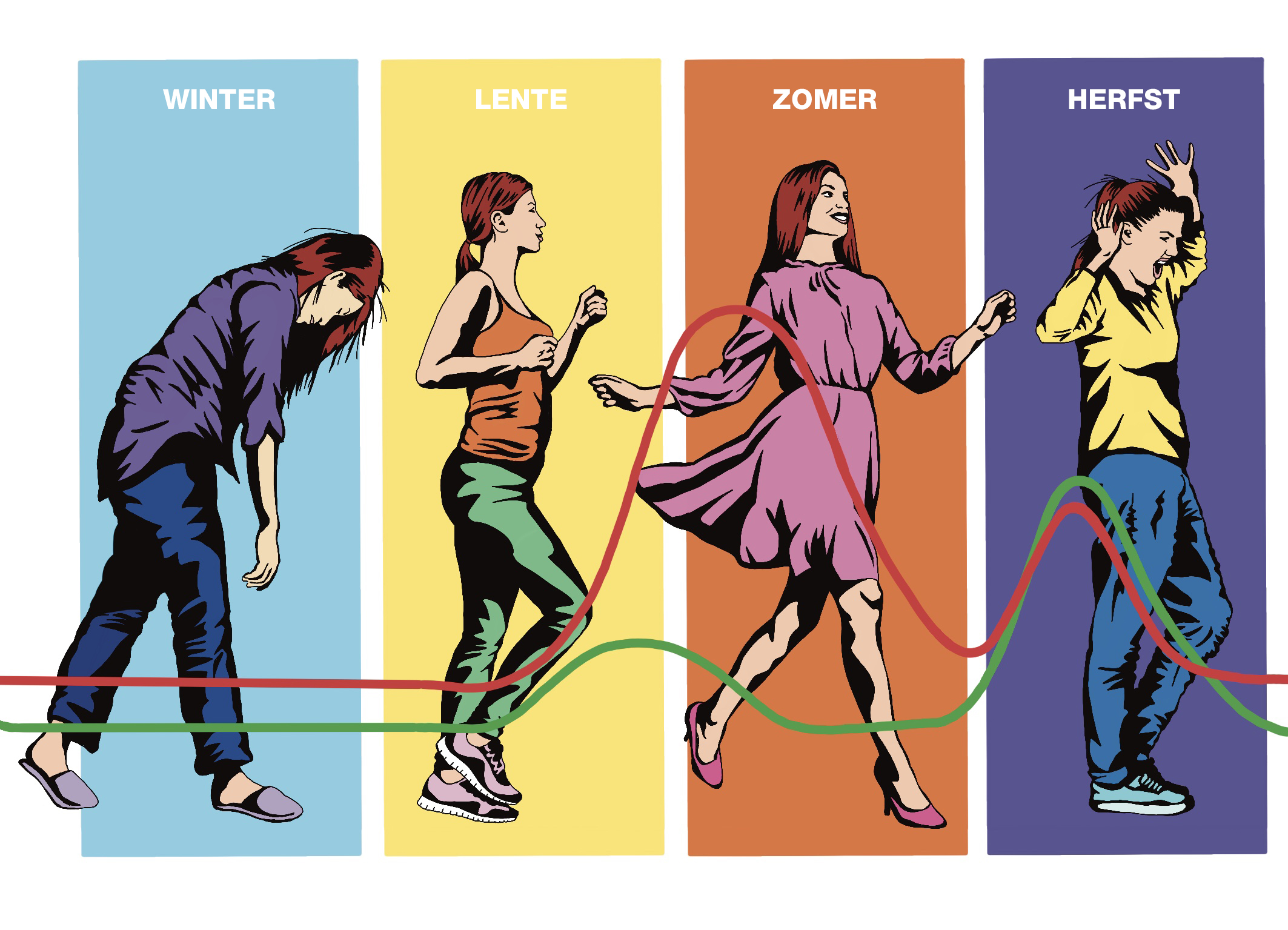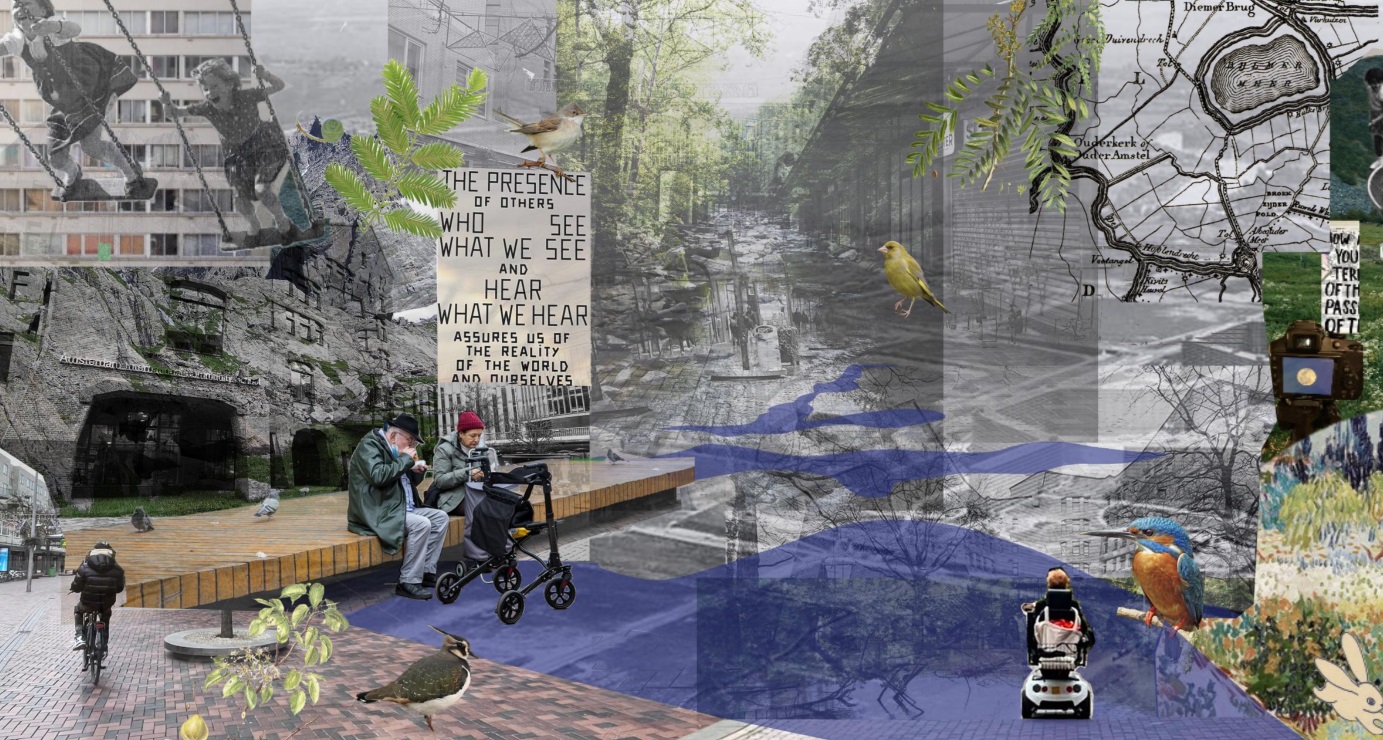Oh, so that’s why you can shift mountains of work at times, while at others you can hardly get out of bed. And that’s why you keep filling up your diary and then don’t feel like doing any of it when the time comes. And speaking of ‘feeling like it’: does this also explain why your response to flirting is glacial at times and at others… well, fill in the blank? Check!
The workshop on ‘Your Natural Cycle’ was always bound to be one of the hits of this year’s Surf your Stress week: it was fully booked in no time. And Impulse was indeed pretty packed on that particular evening. About 100 students turned up, including a handful of men. Great, said workshop leader Anneke Valk, a biology lecturer at Experimental Zoology. Because no matter whether you menstruate yourself: about half of the world’s population does, so you’d better have some understanding of what it entails. ‘One day I want to give a workshop like this specially for men,’ she told Resource later. ‘I wonder who at WUR would have the nerve to hire me to do that.’
Beyoncé hormone
On this occasion, the audience is predominantly female. Valk gives a neat trigger warning beforehand (‘menstruation can be quite a sensitive subject’) and an inclusivity proviso (‘not all women menstruate and not all people who menstruate are women’). She starts off on familiar territory, with the well-known biology textbook image of the vagina, uterus, fallopian tubes and ovaries that everyone saw in high school. But then she really gets going. About how your cycle starts not in your abdomen, but in your brain because that controls the release of the hormone that is dominant in the runup to ovulation, the ‘Beyoncé hormone’ oestrogen. About how after that, the calmer progesterone (‘a bit like Emma Watson’) helps the body and mind prepare for the potential implantation of a fertilized egg. About how those fluctuating hormonal levels cause different phases in a cycle, which British author Maisie Hill, who wrote the book Period Power, compares with the four seasons. Because both physically and mentally, they feel distinctly different.
At Valk’s workshop, you can practically hear the pennies drop
Pure hubris
During Valk’s workshop, you can practically hear various pennies drop. Ah, that’s why you can shift a lot of work so effortlessly in your ‘summer’, or want to party and flirt endlessly (and more): it’s your Beyoncé hormone. And that’s why you fill your diary with all kinds of appointments pure hubris, when two weeks later you’re in the middle of your ‘winter’, the days when you menstruate, and you don’t feel like doing any of it. Or maybe you are still in your ‘autumn’, often the most difficult phase because hormone levels fluctuate the most at that time. Result: snappy, tearful, depressed, poor sleep, binge eating – did someone say PMS? Not the best time for a jam-packed schedule.
Cuddling
Up to a point, something can be done about these ‘seasonal influences’, says Valk. First and foremost: avoid stress. Because stress stimulates the production of cortisol, which puts progesterone out of action: both hormones have the same receptor. Secondly: by exercising, eating healthily and surrounding yourself with people you like – or cuddling a pet, that works too – you stimulate the production of the feel-good hormones serotonin, oxytocin and dopamine. And make sure you get enough sleep. ‘It’s normal to feel more tired in your winter. If you still feel tired in your spring, you could well be seriously overloaded,’ says Valk.
Work with the cycle
When Valk asked at the start of the evening who keeps track of their cycle, three quarters raised a hand. By the end of the workshop, nearly everyone is convinced of the value of doing so. Tips on user- and privacy-friendly apps for the purpose are eagerly exchanged. Those who recognize the pattern in their cycle – 28 days on average, with some fluctuations – can estimate roughly when each season will start. And you can work with that by keeping enough me-time free in your winter, or by planning challenging tasks in your summer, when you are physically and mentally at your strongest.
Contraception
There’s an important detail, though: this only applies to women who are not on hormonal contraception, such as the pill or a hormone coil or ring. Because as soon as your body is absorbing synthetic female hormones, the production of natural female hormones drops, explains Valk: the highs and lows of a natural cycle flatten out. And on that subject, the students are bursting with questions: how bad is the pill really, how long does it take for the natural cycle to get started again, is a copper IUD really completely hormone-free, and also: do you see periodic abstinence as an option? Valk is totally frank with them. About factoring in the risks, whether or not to accept the consequences and also the mind-over-hormones aspect: ‘Let’s be honest: when do you most feel like sex? Exactly, when you’re incredibly fertile. That’s when you really don’t fancy a bit of periodic abstinence, right?’ The audience laughs in confirmation. So yeah, in your summer, you’ll just have to resort to condoms, even though they end up as waste. ‘I comfort myself with the thought that a baby causes a lot more waste,’ Valk jokes. She has a tip on that subject too, by the way: Merle Bombardieri’s book Baby Decision, How to Make the Most Important Choice of your Life. But that’s a workshop in itself.
Hormones & the menopause
When the menstrual seasons stop because you are getting older, that creates new hormonal storms. Valk will give another workshop on that with equal enthusiasm, together with Ingi Alofs, a sports instructor at De Bongerd and a menopause expert with personal experience. Find out more from the Vital@work intranet group (for employees).

 Fluctuating hormonal levels cause different phases in the cycle. British author Maisie Hill, who wrote the book Period Power, compares these to the four seasons. Illustration Valerie Geelen
Fluctuating hormonal levels cause different phases in the cycle. British author Maisie Hill, who wrote the book Period Power, compares these to the four seasons. Illustration Valerie Geelen 

